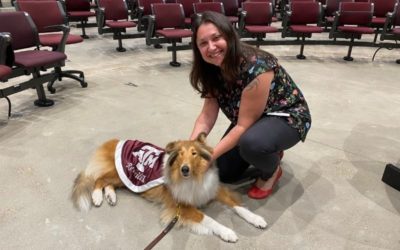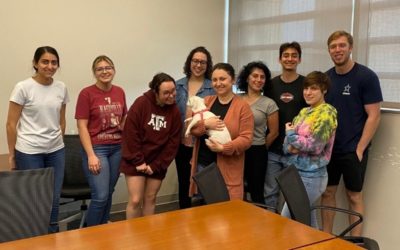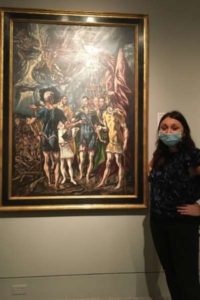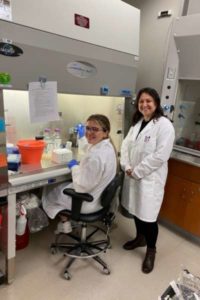 Isabella Farhy is an Assistant Professor in the Department of Biology. The Farhy lab studies the cross talk of two major cell types in the brain, neurons and astrocytes, focusing on how they shape synapse development and activity. Correct formation of synapses is crucial for normal brain function and synapse deficits have been implicated in most brain disorders, including autism, schizophrenia, major depression and Alzheimer’s disease.
Isabella Farhy is an Assistant Professor in the Department of Biology. The Farhy lab studies the cross talk of two major cell types in the brain, neurons and astrocytes, focusing on how they shape synapse development and activity. Correct formation of synapses is crucial for normal brain function and synapse deficits have been implicated in most brain disorders, including autism, schizophrenia, major depression and Alzheimer’s disease.


 What is on your bookshelf?
What is on your bookshelf?
I grew up reading, and to this day, it is one of my favorite pastimes. I cherish my book collection, and try to expand it any chance I get. My favorite author is Herman Hesse, so you will find many of his books on my shelfs. I am also an avid sci fi book fan, and have been pretty much since I learned how to read. One of my favorite Sci fi writers is Vernor Vinge. You will also find books in 3 different languages, as I try to read a book in its original language whenever possible.
What is one thing people would be surprised to know about you?
I studied music for many years as a child, and can play the piano, though I don’t think I am very good at it. I can also play a little guitar and drums, and really enjoy playing music with my children, who I think are much better at playing these instruments than I am.
What is your favorite word?
I have many favorite words. One that I really like is: “onward”
 Describe someone outside your field of interest who inspires you and why?
Describe someone outside your field of interest who inspires you and why?
I am greatly inspired by musicians, both classical and modern. Creating music and playing an instrument is in my opinion such a difficult task, requiring talent, originality, creativity and also, tenacity and determination. Thinking about what these great people achieved and listening to their creations, inspires me to be more determined in achieving my goals, both at work and in life.
What characteristics do you prize most in a colleague?
The characteristics I most prize in a colleague are honesty and support. As new faculty, I oftentimes reach out to colleagues for advice on anything from day-to-day lab operations, working with students, to discussing grant proposal ideas. I really appreciate a direct and straightforward approach, for example, if they think that I need to spend more time working with a particular student, or expand on some proposal idea. These types of critiques, that are constructive are incredibly valuable, and help me greatly to develop myself as PI.
 What’s the best thing about the department of Biology?
What’s the best thing about the department of Biology?
The best thing about this department is its huge diversity of research topics and disciplines. Attending seminars and faculty chalk talks, I get exposed to multiple subjects, research questions and points of view, something that wouldn’t be possible as much in more specialized departments. Not only does it allow me to learn about cool science from fields other than my own, it also enables me to think about my own work through different lenses, leading my research in new and exciting directions I wouldn’t otherwise consider. This environment fosters unique collaborations between people that may not have met under different circumstances.
What advancements do you see on the horizon in your discipline?
This is exciting time to be part of the glia community. Understudied for a long time, glia research has really exploded in recent years, highlighting the crucial role they play in the brain. New discoveries about their functions, as well as new tools to study them are constantly being developed. Yet, there is still so much we don’t know or understand about how these cells function across different life stages, brain regions and species. Future research will reveal the specific roles of glia cells within the complex environment of the central nervous system in the healthy organism, and how these functions are altered in disease. These discoveries will enable researchers to target glia cells for therapeutic purposes, to treat a variety of brain disorders in which glia deficiency has been observed, such as autism, Alzheimer’s disease, and stroke.
 What is the broader significance of your research?
What is the broader significance of your research?
The communication between neurons at synapses enable all our actions and thoughts, while synapse deficiencies have been observed in multiple brain disorders for which there are limited or non-existing treatments, including autism, schizophrenia, and Alzheimer’s disease. To find effective treatments for these and other disorders it is important to identify the genes and proteins that play a role in regulation of synapses. Astrocytes, a type of non-neuronal cells have recently emerged as crucial regulators of synapses, yet the cellular factors involved are not fully understood. In my lab, we explore the mechanisms of astrocyte-neurons interactions that underlie synapse development and function in the healthy brain. By identifying the central molecular players in these interactions, we aim to find novel druggable targets to correct synaptic dysfunctions, to better the lives of people suffering from debilitating neurological disorders.
